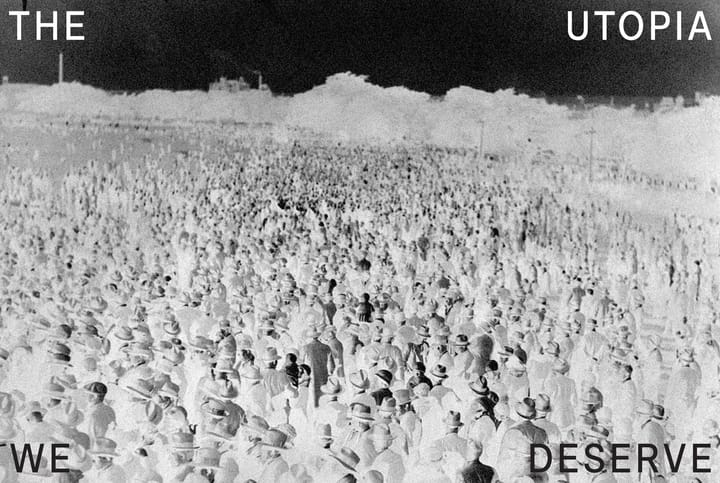Olympian Contradictions
The NHS represents the contradiction between the idealized history and the creaking present of the UK.

Editor's note: Damage Issue 1: Building Big Things features multiple "Then" and "Now" vignettes. This article is one of the latter; its companion, "Nationalization Took Time," can be found here.
When the Olympic Games were held in London in 2012, the opening ceremony revealed the central place that the NHS continues to hold in the social imaginary of modern Britain. Choreographed by Danny Boyle (the director of Trainspotting, 28 Days Later, and The Beach), the ceremony featured dancing nurses, the name of the famous Great Ormond Street Hospital for children up in lights, and a pulse beat circling the Olympic stadium—all as part of the “Best of British” montage (which also included James Bond, the Queen, and Kate Bush’s music).
What Boyle’s ceremony could hardly have represented, though the British public all knew, was that the NHS was one of the most contested battlegrounds of British neoliberalization. This battle over the privatization of public services started with the Thatcher and Major Conservative governments, and was put on steroids (so to speak) by Tony Blair and New Labour. Perhaps the key policy in this story was the widespread use of private finance initiatives (PFIs), launched in 1992 by Major, which aimed at creating public-private partnerships (PPPs) for the delivery of NHS services and the construction of new hospitals. These contracts (often awarded in highly dubious circumstances) represented terrible value for the public, with hospitals being built late and over-budget, while unworkable IT system upgrades became a familiar thorn in the side of anyone working in the NHS. More importantly for the neoliberal proponents of PFIs and PPPs, these initiatives hollowed out the NHS itself, making it incapable of building out or delivering key services, and demoralizing staff while establishing a cadre of middle-management PFI contract overseers opposed to the social democratic ethos of the NHS as an institution.
Boyle’s Olympic celebration also shows the contradictory position held by the NHS, and, by extension, the British nation. In reality, PFI hospitals rent buildings, land, or assets from private partners (which had not happened in 1990, prior to PFI), with many losing more than 15% of their budget this way. At the same time, the NHS is still a part of British self-identity and represents an idealized Jerusalem of post-war national institution-building and the continued fight against that “Giant Evil” of disease.
Not much has changed since 2012. In 2020, the contradiction between the idealized history and the creaking present was evident in the Government’s instruction, as Covid worsened, for the British public to “stay home, protect the NHS, save lives.” Only a few wondered where the NHS was to protect us. The stripping out of NHS capacity—with less than half the number of hospital beds in 2017 than before PFI—was also clear in the NHS’s proactive response to Covid. The “Test and Trace” system that the UK government put in place to tackle Covid was, as Marianna Mazzucato and Rosie Collington report in their 2023 account of the consulting industry The Big Con, only half-filled by NHS staff. Deloitte’s consultants, to the tune of £1m a day, accounted for nearly half the staff of the project.
There is no reason to think that the NHS will not remain a contradictory but central image in British politics. In October 2020, Prime Minister Boris Johnson announced that the NHS would be building 40 new hospitals by 2030, hailing the “biggest hospital building programme in a generation.” Johnson resigned two years later without making good on this promise. His successor, Liz Truss, did not stay in office long enough to see through what would have very likely been a turn to market forces within the NHS and beyond, and current Prime Minister Rishi Sunak shows little inclination to foreground the “Leveling Up” agenda and building promises Johnson made.
Beyond the orientation of contemporary Conservative premiers—or the likely approach of a Labour Government under Starmer—there remains a deeper challenge to any large-scale hospital building project within the NHS. As the prior period of hospital construction made clear, the making of any national health service needs a set of political actors willing and able to embrace the nation that underlies it. Britain’s political class was raised during the period of its membership of the European Union—a structure designed to help elites across Europe to evade democratic accountability at the national level. Having now left the EU, any nettle of large-scale national infrastructure renewal is even harder for the political class to grasp. The success or failure of any hospital building project has to be located in the willingness of the rest of us to take control and responsibility for building one as part of a post-Brexit nation.
■
George Hoare’s latest book is Taking Control: Sovereignty and Democracy After Brexit.



